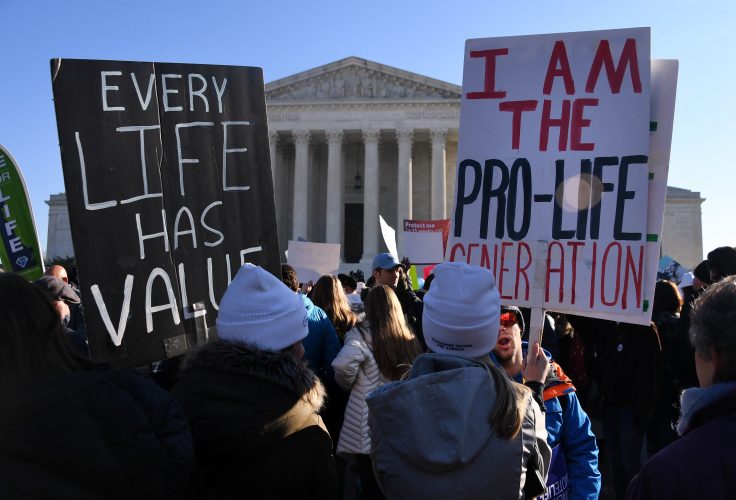The Supreme Court on Friday allowed abortion clinics in Texas to proceed with their challenge to the state’s heartbeat law, which will remain in effect for the time being.
The outcome enables abortion providers to request a long-sought order blocking the law in full. The decision is splintered over several opinions that reveal deep and fractious divides among the justices. The justices dismissed a separate lawsuit from the Biden administration without comment.
Friday’s decision, though a victory for the law’s critics, could prove meaningless by the summer. The justices signaled during oral arguments on Dec. 1 that they will uphold a Mississippi law that bans abortion at 15 weeks, and could skuttle Roe v. Wade altogether. Providers in Texas will be in a holding pattern until the Court decides the Mississippi case, Dobbs v. Jackson Women’s Health Organization.
Eight justices splintered over several opinions allowed the clinics to move forward with their lawsuit. Justice Neil Gorsuch delivered the Court’s opinion, joined by Justices Samuel Alito, Brett Kavanaugh, and Amy Coney Barrett. Justice Clarence Thomas joined most of the Gorsuch opinion but wrote separately to say he would not allow the clinics’ lawsuit to go forward.
Abortion services have ended for the most part in Texas, and Monday’s result may not change the situation on the ground. The act dictates that providers may be held liable for performing abortions if Roe is narrowed or overturned. It’s possible that Texas providers will curtail their services significantly until the Court gives more definite guidance in the Dobbs case.
Recent surveys show the political tumult that followed enactment of the act has leveled off. Texas voters identified border security as the state’s most pressing concern, according to a Quinnipiac poll released this week, with 33 percent of respondents identifying it as the top issue. Abortion ranked third behind the economy, clocking in at just 9 percent. Gov. Greg Abbott (R.), who signed the bill in May, is leading his top Democratic challenger by 15 points ahead of next year’s election.
Clinics in Texas have maintained that they are fully complying with the act. Data from researchers at the University of Texas suggest abortions have declined by 50 percent since the heartbeat law took effect. Their figures show there were about 2,200 abortions in Texas in September of this year, down from about 5,400 in August.
It's difficult to subvert the Texas act in its entirety because private citizens are responsible for its enforcement. When a court finds a particular law unconstitutional, it bars the relevant government officials from enforcing it. That path isn't available here because any number of ordinary people can enforce the act.
The pro-abortion plaintiffs in Friday’s case proposed a workaround: They could sue Texas court officials to block them from accepting heartbeat act lawsuits in the first place. A majority of the Court rejected that proposal. The Court said such claims are barred by precedent and that court clerks aren’t participants in legal disputes in the sense necessary to trigger a federal court’s jurisdiction. A majority of the Court also rejected an alternate theory that the plaintiffs can sue Texas attorney general Ken Paxton.
A majority of justices, however, said the clinics can sue four state licensing officials who are responsible for enforcing state safety rules, which to the Court's eye includes the heartbeat law. A complaint from the pro-abortion side against those officials is likely in short order.
Chief Justice John Roberts wrote a partial dissent, which the liberal trio joined. The opinion’s sharp voice is a notable departure from Roberts’s usual tone. He pointedly accused Texas of nullifying the Court’s abortion precedents and equated its behavior with mockery of the Constitution. He said the case presented a fundamental question of judicial power to review the law.
"The nature of the federal right infringed does not matter; it is the role of the Supreme Court in our constitutional system that is at stake," Roberts wrote.
Justice Sonia Sotomayor delivered another partial dissent for the Court’s liberal trio. Sotomayor has been a persistent and outspoken critic of the Texas law since the Court allowed it to take effect in September.
"The Court should have put an end to this madness months ago, before S.B. 8 first went into effect," Sotomayor said. "It failed to do so then, and it fails again today." She further accused the Court of "betraying" the people of Texas.
The cases are No. 21-463 Whole Woman’s Health v. Jackson and No. 21-588 U.S. v. Texas.
